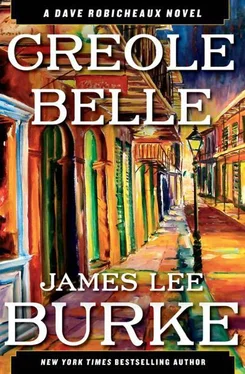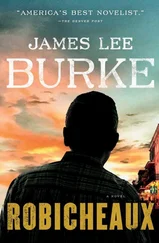James Burke - Creole Belle
Здесь есть возможность читать онлайн «James Burke - Creole Belle» весь текст электронной книги совершенно бесплатно (целиком полную версию без сокращений). В некоторых случаях можно слушать аудио, скачать через торрент в формате fb2 и присутствует краткое содержание. Жанр: Криминальный детектив, на английском языке. Описание произведения, (предисловие) а так же отзывы посетителей доступны на портале библиотеки ЛибКат.
- Название:Creole Belle
- Автор:
- Жанр:
- Год:неизвестен
- ISBN:нет данных
- Рейтинг книги:3 / 5. Голосов: 1
-
Избранное:Добавить в избранное
- Отзывы:
-
Ваша оценка:
- 60
- 1
- 2
- 3
- 4
- 5
Creole Belle: краткое содержание, описание и аннотация
Предлагаем к чтению аннотацию, описание, краткое содержание или предисловие (зависит от того, что написал сам автор книги «Creole Belle»). Если вы не нашли необходимую информацию о книге — напишите в комментариях, мы постараемся отыскать её.
Creole Belle — читать онлайн бесплатно полную книгу (весь текст) целиком
Ниже представлен текст книги, разбитый по страницам. Система сохранения места последней прочитанной страницы, позволяет с удобством читать онлайн бесплатно книгу «Creole Belle», без необходимости каждый раз заново искать на чём Вы остановились. Поставьте закладку, и сможете в любой момент перейти на страницу, на которой закончили чтение.
Интервал:
Закладка:
When I went into Clementine’s, Clete was standing at the bar, a tumbler of vodka packed with shaved ice and cherries and orange slices and a sprig of mint in front of him. I sat down on a stool and ordered a seltzer on ice with a lime slice inserted on the glass’s rim, a pretense that for me probably disguised thoughts that are better not discussed. “You want me to go back to New Orleans with you?” I said.
“No, I put my sister on a cruise, and my niece is visiting a friend in Mobile, so they’re okay for now,” he said.
“How about later on?”
“I haven’t thought it through. I’ll let you know when I do,” he said.
“Don’t try to handle this on your own, Clete. There’re lots of ways we can go at these guys,” I said.
“For instance?”
“Go after Grimes for vehicular homicide of the child.”
“Using what for evidence? The testimony of his junkie parents who already flushed the kid down the drain for their next fix?”
The bar was crowded and noisy. Inside the conversation about football and subjects that were of no consequence, Clete’s face seemed to float like a red balloon, estranged and full of pain. “I grew up around guys like Golightly and Grimes. You know how you deal with them? You take them off at the neck.” He put two aspirins in his mouth and bit down on them. “I’ve got this twisted feeling high up in my chest, like something is still in there and it’s pushing against my lung.” He took a deep drink from his vodka, the ice making a rasping sound against the glass when he set it down on the bar. “You know the biggest joke about all this?” he said.
“About what?”
“Getting shot. Almost croaking. I would have bought it right there on the bayou if the bullet hadn’t hit the strap on my shoulder holster. I got saved by my holster rather than by my piece. That’s the story of my fucking life. If anything good happens to me, it’s because of an accident.”
“Sir, would you hold down your language, please?” the bartender said.
“Sorry,” Clete said.
“Let’s get out of here,” I said.
“No, I like it here. I like the bar and the food and the company, and I have no reason to leave.”
“Meaning I do?” I said.
“You know anybody who goes to a whorehouse to play the piano?” He thought about what he had said and smiled self-effacingly. “I’m just off my feed. I’m actually very copacetic about all this. Is that the iPod you had at the recovery unit?”
“Yeah, I was listening to Tee Jolie Melton’s songs. ‘La Jolie Blon’ is on there.”
“Let me see.” He picked up the iPod from the bar and began clicking through the contents. “There’re only a few songs on here: Will Bradley and Taj Mahal and Lloyd Price.”
“Tee Jolie’s songs are on there, too.”
“They’re not, Dave. Look for yourself.”
I took the iPod back and disconnected it from the headphones and put it in my pocket. “Let’s take a ride up to St. Martinville,” I said.
“What for?” he asked.
“I know where Tee Jolie’s house is.”
“What are we going to do there?”
“I don’t know. You want to stay here and talk about football?”
Clete looked at the bartender. “Wrap me up an oyster po’boy sandwich and a couple of Bud longnecks to go,” he said. “Sorry about the language. I’ve got an incurable speech defect. This is one of the few joints that will allow me on the premises.”
Everybody at the bar was smiling. Tell me Clete didn’t have the touch.
Burke, James Lee
Creole Belle
I T WAS RAINING when we drove up the two-lane highway through the long tunnel of trees that led into the black district on the south end of St. Martinville. A couple of nightclubs were lit up inside the rain, and flood lamps burned in front of the old French church in the square and shone on the Evangeline Oak in back, but most of the town was dark except the streetlamps at the intersections and the warning lights on the drawbridge, under which the bayou was running high and yellow, the surface dancing with raindrops.
Tee Jolie had grown up in a community of shacks that once were part of a corporate plantation. The people who lived there called themselves Creoles and did not like to be called black, although the term was originally a designation for second-generation colonials who were of Spanish and continental French ancestry and born in New Orleans or close proximity. During antebellum times, there was another group of mixed ancestry called “free people of color.” During the early civil rights era, the descendants of this group came to be known as Creoles, and some of them joined whites in resisting court-ordered school integration, a fact that always reminds me elitism is with us for the long haul.
Tee Jolie had lived with her mother and younger sister in a two-bedroom cypress house on the bayou, one that had a rust-stained tin roof and pecan and hackberry trees and water oaks in front and clusters of banana plants that grew above the eaves and a vegetable garden in back and a dock on the bayou. When Clete and I drove into the yard, I didn’t know what I expected to find. Maybe I wanted proof that Tee Jolie was all right and living in the New Orleans area and that she actually visited me in the recovery unit on St. Charles Avenue. I didn’t think my visit was self-serving. I wanted to know that she was safe, that she was not among dangerous men, that she would have the baby her lover had told her she could abort, that he would turn out to be a decent man who would marry her and take care of their child, and that all good things would come to Tee Jolie Melton and her new family. That was what I sincerely wished, and I didn’t care whether others thought I was delusional or not.
Clete and I stepped up on the gallery. The wind was blowing in vortexes of rain across the property and on the trees and the great green shiny clusters of flooded elephant ears that grew along the bayou’s banks. When the door opened, we were not prepared for the person silhouetted against a reading lamp in the background. He walked with two canes, his spine so bent that he had to force his chin up to look directly at us. His hands were little more than claws, his skin disfigured by a dermatological disease that sometimes leaches the color from the tissue of black people. It would not be exaggeration to say he had the shape of a gargoyle. But his eyes were the same color as Tee Jolie’s, a blue-green that had the luminosity you might see in a sunlit wave sliding across a coral pool in the Caribbean.
I introduced myself and showed him my badge. I told him I was a friend of Tee Jolie and had recently seen her in New Orleans, and I wondered if she was all right. He had not invited us inside. “You seen her, suh?” he said.
“Yes, she visited me when I was recovering from an injury. Are you her relative?”
“I’m her grandfather. After her mama died, she went away. That was maybe t’ree months ago. Right there on the dock, a man picked her up in a boat, and we ain’t seen or heard from her since. Then her little sister, Blue, went away, too. You ain’t seen Blue, have you?”
“No, sir, I’m afraid not. May we come in?”
“Please do. My name is Avery DeBlanc. You’ll have to excuse the place. It ain’t very neat. Y’all want coffee?”
“No, thank you,” I said. Clete and I sat down on a cloth-covered couch while Mr. DeBlanc continued to stand. “Did you report Tee Jolie’s disappearance?”
“Yes, suh. I talked to a deputy sheriff. But wasn’t nobody interested.”
“Why do you think that?”
“’Cause the deputy tole me Tee Jolie’s got a reputation. This is the way he said it: ‘She got a reputation, and let’s face it, ain’t none of it is good.’ He said she run off in high school and she hung out wit’ young people that sells dope. I axed him which one of them don’t sell dope. I called him twice more, and each time he said there ain’t any evidence a crime was committed. I got to sit down, me. I cain’t stand up long. Y’all sure you don’t want coffee?”
Читать дальшеИнтервал:
Закладка:
Похожие книги на «Creole Belle»
Представляем Вашему вниманию похожие книги на «Creole Belle» списком для выбора. Мы отобрали схожую по названию и смыслу литературу в надежде предоставить читателям больше вариантов отыскать новые, интересные, ещё непрочитанные произведения.
Обсуждение, отзывы о книге «Creole Belle» и просто собственные мнения читателей. Оставьте ваши комментарии, напишите, что Вы думаете о произведении, его смысле или главных героях. Укажите что конкретно понравилось, а что нет, и почему Вы так считаете.












